Radder Than Rad. About 'King of Fuh' by Brute Force, The Beatles' Apple Records Most Controversial Single... And More
An Interview with Stephen Friedland
In 1968, right at the outset of The Beatles' venture into music as executives with their label Apple Records, a revolutionary, bold and perhaps obscene record was pressed. Its catalog number was APPLE 8, and both George Harrison and John Lennon were enthralled by "King of Fuh," the song in question, a single that ultimately wasn't distributed. The reason lay in the wordplay of the lyrics, which narrated the tale of a wonderful land called Fuh where there was a king who everyone called the Fuh King. It was all about phonetics.
The artist behind it went by the name Brute Force. It was somewhat ironic, as there was force and energy, but well channeled into a harmonic sequence reminiscent of a 19th-century English march and a melody echoing the bucolic psychedelia of tea, pastries, and LSD, so popular the previous year. The verses were woven with poetic elegance as Brute Force described the world and questioned why people didn't bow before the beauty he saw. But in the middle of it all, the F-bomb dropped: the ugly word, humorous and defiant, “all hail the Fuh King! The mighty Fuh King!” It was clear why John and George were so taken with it.
In addition to all this, Brute Force, whose real name is Stephen Friedland, was a Jewish American singer-songwriter, born in New Jersey but settled in New York. And while he was seen as a novelty, he hadn't come out of nowhere. Friedland already had a substantial catalog of songs recorded by popular artists like Peggy March, Del Shannon, the Chiffons, and The Cyrkle (a group that Brian Epstein managed briefly from 1965 to 1968). He had also been a keyboard player, rhythm guitarist and songwriter for The Tokens, who before his arrival had achieved worldwide fame with "The Lion Sleeps Tonight," the pop adaptation of the South African Solomon Linda's song "Mbube," long thought to be folkloric and ancestral.
In 1967, he recorded the album I, Brute Force—Confections of Love for Columbia Records, which, in the spirit dominating that year, contained a highly effective blend of music hall, beat poetry, pop with baroque tendencies and pastoral orchestrations, and a sharp sense of humor influenced by Lenny Bruce as well as off-Broadway musicals. In 1970, he released Extemporaneous on B.T. Puppy Records, the Tokens' and the Happenings' label. It was a live-recorded album at Olmstead Recording Studio and it encapsulated the essence of Brute Force, a performance that included jokes, poems, anecdotes, psalms, prayers for peace, outbursts, and a refined selection of highly original songs in their pure essence: just a piano, a voice, and an audience, and lots of pizza. An exercise in presence.
But back to 1968. Despite George Harrison and John Lennon (with a little help from Yoko Ono) advocating for "King of Fuh," the single couldn't take off. Capitol, who continued to distribute their work in the United States, flatly refused. With Two Virgins, John and Yoko's album where they appeared nude on the cover still fresh in memory, and issues like student protests, the Vietnam War, and the entire tumultuous world of that year, there was no way to convince any executive to take a risk. Although it was solely a matter of words, the power of language was daunting. The record was banned, the Beatles printed a thousand copies to be distributed among close associates, and that was that. Although it was assigned a catalog number, the “King of Fuh” single was never commercially released and consigned to the exile of obscurity. Over time, not only did the record gain value in the market due to its rarity, but curiosity grew to become the piece that stimulated the imagination of the musicians who shaped the pop sensibility of the century.
Finally, in 2010, "King of Fuh" was given the recognition it deserved for years. With the release of the CD compilation Come and Get It: The Best of Apple Records—a disc that served as a showcase for the best that The Beatles' label released during its erratic heyday between 1968 and 1972—Brute Force was validated as an Apple artist to the world. His controversial song was track 5 on the compilation, rubbing shoulders with Badfinger, Mary Hopkin, James Taylor, Ronnie Spector, Billy Preston, Doris Troy, and Jackie Lomax, alongside other artists demanding their own vindication like Lon & Derek van Eaton, Chris Hodge, Trash, and the early world music project Radha Krishna Temple. If The Beatles' goal with their own record label was to tell the world new and groundbreaking music, Brute Force belonged rightfully, although circumstances prevented it back then.
I spoke at length with Stephen Friedland on the afternoon of July 15, 2024, about "King of Fuh," his music, and his life. The following text is the result of that conversation, which was only slightly edited or condensed for clarity and pacing.
From Jersey to Fuh
I was born to a young American Jewish woman whose heritage was from Russia. She was an artist, who would create the most amazing drawings with pencil and ballpoint pen on gray cardboards, the kind you use to keep the shape of shirts delivered by the dry cleaner service. And my Jewish father, whose brilliance as an attorney made such luxurious seacoast living possible just a few hundred paces off the Atlantic Ocean, came to New York City via Ellis Island in 1910 from Russia. Imagine: by the time I was born, in 1940, he was an elected official in the New Jersey Assembly. He told me that as a boy he would see cossacks on horseback riding through the tiny village, waving swords. His father was a rabbi. Dad got out of there just in time, prior to the war and the revolution.
So I do have this Russian heritage which resulted in me studying Russian at Monmouth University. I actually recorded a song in Russian, “Hello Moscow” for Columbia Records. It was intended for the first edition of I, Brute Force Confections Of Love, but I think they didn't include it in the album because, at the time a Cold War was happening, and feelings toward Russia weren't friendly. Through time, as an American, I've come to understand I live on a planet with lots of other people, and we all can sing together.
We are here now. Be Here Now, that’s the title of a Ram Dass book—and later a George Harrison song. That was like the Bible for me in the 60’s. Look at those three elements. Being, however far you can go with that, a verb, you are born and you are. Then it’s here, a place, however far you want to go with that, because we can even incorporate the universe in that, can’t we? We are alive and that means we are in a place. And now, time. We are also a part of time. Place and time and all that is in between, within us and without us. Pretty good combination.
I was born in 1940. The same year as John Lennon. A few days away from him. I live a walking distance from Strawberry Fields here in New York. I can cross Central Park and go south a little to the 72 Street area. I have this friend who is a super Lennon fanatic and she puts out petals around the Imagine mosaic all the time. It’s beautiful to see how people in their unbelievable grief transposes that into beauty. Or is it that we all just share the guilt of how young Lennon had to go?
Beauty is truth. That’s all you need, you know. Is it Keats who said: “That is all. Ye know on earth, and all ye need to know”. I’ve been attuned to that concept. I was brought up and blessed with great parents that kept me in a beautiful place. We would go to the seashore and it was all so beautiful, so my eyes and my brain kept connecting to everything that was just flowing in. I spent a lot of my time in the sea, seeing the little fishies underwater. I saw the sunrise and the sunset. And so the beauty was incorporated into me.
A life in music
I had a girlfriend whose father, Billy Gussak, took a liking to me. He was the studio drummer with Bill Haley and The Comets. He liked a song I wrote and took me into New York City to meet Hugo & Luigi—the production team formed by songwriters Hugo Peretti and Luigi Creatore at the Brill Building—who at the time, 1964, were producing Little Peggy March at RCA. Billy Gussak took a song of mine, which I styled after the chords to Moonlight Sonata and put some words on top of that, that I called “Don’t Be Afraid”. They recorded it with her and released it. That was quite something. Then I went over and met The Tokens, whom they also produced. That was the beginning of a lot for me, because their bass player, Joey Venneri, had left them. I played a few songs for them and I ended up joining the group and writing songs for their publishing company. And I became a Token!
In 1967 I met Tommy Dawes of The Cyrkle, who toured with the Beatles one year prior. I had written this song called “King of Fuh” and I learned that the Beatles had started the Apple project. Through my persistence I convinced the Tokens production company to record the tune; they had refused for months—although, as everyone, they loved it—believing that “King of Fuh” wouldn’t get any airplay. They were intensely correct.
I figured that the Beatles would like the song—done with Mitch and Phil Margo, bless their souls—and that maybe, maybe they would even dare to do it. So I gave the tape to Tommy Dawes and he brought it to Nat Weiss, the United States attorney for the Beatles, who one day played it to George Harrison… and bingo!
George loved it. John loved it. So, now I'm an Apple artist, right? And I get a long distance call from Geo and John. You gotta be kidding! But, no, it’s really them. And beautiful young Stephen, who has chosen to remain in New York City to pursue the music biz dream, instead of returning to Emerson College for a Masters Degree in Drama, is on the top of the world. But that doesn’t last, doesn’t even happen, just in my imagination—and John’s and George’s: what an incredible connection with two of the greatest minds of all centuries—because in the real world there are practical things. One of them is called distribution. And without it, even if I have the Apple label sanctioning, I cannot go anywhere. Capitol is refusing to distribute my song. They think it’s obscene because the word play resembles a foul word. But what is a foul word, really?
Brute force
That phrase, “brute force”, has been used many, many times throughout our times—perhaps a sign of them. It was a famous movie, you know, with Burt Lancaster. And just yesterday, in a commentary about our political reality, somebody just used the phrase. I said: “Wait a minute, this is too great!”
How did I choose the name? Well, it was my psyche at the time. I was very guarded, very shielded as a young man. I was around 24, 25 years old when I was with the Tokens and we were seeking a name for my solo act. It all has to do with this subject, identity. I-I-I, identity, you see? I was with them in a studio to record some music, sitting at the board, talking about what name would suit my solo outing because I was assuming that Stephen Friedland would not be correct: what a dumb thing to think! Frank Sinatra didn’t do that, did he? Or Perry Como! But I was influenced by Hollywood and people coming out with these ridiculous names. So I said “Crude Brute” and that shows you where I was at. But then Jay Segal—the lead singer of the Tokens at that time, you all know him, the one with the dee-dee-dee-dee voice in “The Lion Sleeps Tonite”—blurted out “Brute Force”. That was it! That was the beginning of that.
Crowning a king
“King of Fuh” is the foremost proponent of my coined genre of heavy funny. In the lyrics, the words are funny in the manipulation of the sound, the vibrations of the popular colloquial phrase. But the whole lyrics are about beauty: “You look down on the ground and you see the flowers and they are red and blue and brown and you wonder why people don’t worship beauty”. But “King of Fuh” also introduces an element of chaos with that phrase, something I’ve been theorizing about forever. You introduce chaos into a controlled atmosphere and things happen, it all moves. The beauty of the sky is a harbinger of chaos, because I think that our minds are constantly into the unknown. That is how it works. Like it ot not, the sky is also The Great Unknown.
Everyone talks about the lyrics, but Elgar’s Pomp and Circumstance was so inspirational to me for the chordal progression of “King of Fuh”. The music is great, we all have to admit. It is a beautiful song.
I am so honored to be on the Apple compilation, Come and Get It. Finally, “King of Fuh” is above the table, it took 41 years from 1969 to 2010. To be on a CD with those artists is just great. I can always brag about this, you know? I can always say to someone, yeah, well, where is your Apple record? I guess I’m one of the last surviving Apple artists.
Meet the Beatles. Or not
I didn’t get to meet the Beatles personally. I met them just in spirit. I spoke on the phone to George Harrison and John Lennon. And George sent a letter to me.
I got the call one day in the period before the non-release of “King of Fuh”, before the censorship. It was before Capitol Records refused to distribute. I was living with my girlfriend-about-to-be-wife—the dearly departed Cynthia—who became a line producer with the late night show Night Flight. I’m in the apartment and the phone rings: “Hello, this is John. This is George”. And I say: “Come on, really?” “Yeah, right, it’s us”. We go on for maybe three minutes or so and they tell me I’ve got a record on Apple and I am astounded. “Are you kidding me?” “No, no, man. It’s all good”. The spirit made the spirit. I said something innocuous, who knew what to say? Something like “May the spirit bless you”, that type of stuff. And the phone call is over. And there I am, thinking I am now an international star. I have made it!
But no. I was up for some very, very unbelievable letdowns. Apparently, everyone was afraid of this record. Afraid of some words. And they’re not even those words, it’s all a game, it’s wordplay, a matter of phonetics. But no one wants to hear about it. It’s the fear of sound, the effect of sound upon the minds of people, which is really a magical concept if you think about it. You may say it would have to do with curses, which is an ancient thing. Or saying something which will affect people, retune their reality, make things better or worse because of the mere sound of it. Magical thinking! But the vibrations themselves are not good or bad. It’s what we make of them. We have the power. Then give us the power!
In the mind of the Capitol executives, this was not to happen. Ken Mansfield, in his book The Roof: The Last Beatles Concert, reprints the letter that Stanley Gortikov, president of Capitol Records at the time, sent regarding “King of Fuh”. He, in no uncertain terms, describes why they will not approve distribution. He finds the record whimsical and clever, but a risk commercially speaking. He fears that, after John and Yoko’s Two Virgins with its naked cover art, this will further harm the Beatles reputation and sales. There is a system and he cannot fight it—although I think I can, and the Beatles certainly did—and so he has to decline distributing my song because the phrase Fuh King sounds a lot like fucking and, yes, that is my intention, it’s all playful, it’s a challenge for all the intelligent listeners out there, and I know there are millions of them. But they say no. No trust in this. Gotta keep the status quo. And there went my career. I had no management. I had no one to tell me: “Hey, let’s sue the asses of these people”. And I couldn’t think of it, my mind was in many different places. I was just a creator. And so what happened, happened.
George added strings of the London Philharmonic Orchestra. That was great. Every time I hear them now, you know, I tell everybody they’re my buddies. Me and the London Philharmonic, that has to be crazy.
I went to England and visited 3 Savile Row. I asked for George, sure. But only Peter Asher was there, a lovely young boy with red hair, working hard for the Apple organization. And somebody said that George wasn’t there. “He’s very provincial”, they said, meaning that he was somewhere sequestered off in his home. He had a beautiful, beautiful home. I later met Olivia Harrison at a book signing here in New York, what a lovely lady. And John was also nowhere around.
Speaking about 3 Savile Row… Mansfield, in another book—The Beatles, The Bible, and Bodega Bay—describes a meeting in 1969 with John and Yoko at the premises, when he worked for Capitol Records. John wanted Capitol to distribute “King of Fuh” in the United States. Mansfield refused and John called him a “tight assed censor”. That was the first time I actually saw the proof of censorship in print. It was 2000, 31 years after APPLE 8.
I was at the Apple offices at least twice, feeling like a star. When I went back the second time to get the tapes I met Mal Evans, rest his soul. Ken Womack just published an excellent book about him; Womack is now a professor at my alma mater, Monmouth University, it was Monmouth College at that time. Anyway, Mal Evans took me to a certain studio somewhere else and handed me the tapes. London was quite something then!
The land of Fuh is Jewish
I’m bar mitzvahed. I studied. I try my best now to keep shabbos, to light a candle, to say the prayers correctly. My spiritual life incorporates my Judaism.
The sixties, were they Jewish at all? At that time I was just getting into the New York City music business. As far as my Judaism went, I would attend every year the holidays—the Seder, for instance—at my Aunt Jackie, G-d bless her soul, my mother’s sister. I wasn’t really going to synagogue. I had the privilege to have a bar mitzvah in 1953 and I should have taken those rules to heart and kept following them, but I became very hippie, very liberal. I was given the privilege of learning the Ten Commandments so my moral compass would have been established. But following it was very difficult. It took me a while to regain the correct wisdom that I had learned as a bar mitzvah boy, you know, honor thy mother and father, honor G-d… It took me a while to get back into The G-d.
But, on the other hand, by working in the music industry and by pursuing my art and craft instead of, for instance, finishing my master's degree at Emerson College—where I met Henry Winkler, I met Spalding Gray, you know—I would have become a teacher in drama. There would have been no Brute Force!
I was once walking with my father and he asked me if I wanted to go back to school. I remember that, clear as day. I said no, I want to be a songwriter. He was not pleased, but he honored what I wanted to do. Gave me his blessing. So it took a long while for me to stop, to regain my path, to gain strength along the way. But, if I have to say something, I never forgot I was Jewish. I’m so proud to be so. We raised our daughter Jewish.
Judaism seems to me one of the most forgiving lifestyles, one of the most embracing peoples. The Jewish nation, from time to time—like just right now—has its back against the wall. I am not talking only about the state of Israel, but the Jews as a nation, a collective, a people. G-d has been good to me. I say, G-d has been very good to me. I don’t know if I’ve been a good Jew. But I am trying. I married a Jew. It was a Jew, a drummer, who got me into the music business. He brought me into New York City, he did everything for me. And I took advantage of it. That’s how it works. He puts us here but it’s us who have to work out stuff. Jews cannot be passive.
I wrote a song—the chorus sings let's put them all together now: Buddha, Allah, Moses, Krishna— after I got myself into the study of Sufi and the incorporation of all spiritual ideals. I walk into churches, I walk into temples, into synagogues, I sit down, I pray. I talk to Muslims and I ask them questions. “If G-d is one”, I tell them, “as Christianity, Judaism and Islam say, then what’s the problem?” Why, after all of these tens of thousands of years of this manipulation of thought, can’t we do what’s necessary? This is a limited life, in a limited time and space. And if God is one, then it’s all the same, there is no better one, no comparison, no competition.
I have been reading this book, Shaar HaBitachon, which means “Gate of Trust”—by the eleventh-century Spanish scholar Rabbeinu Bachya ibn Pekuda—and it’s a work about trusting that G-d is always with you in both the good and the bad. You’re on a line. To where? Who knows. But G-d is with you, there is no doubt. I’ve never felt intelligent enough to say there is no G-d. There is always so much to cope with in life but we are capable of it and more. It’s because we’re spiritual beings. Judaism recognizes both light and dark. And we are all very young—even if I am 83! Just think about it, in the scope of all time, we’re a new species, we’re just finding out everything. We are always on the brink of great, great new discoveries all the time. Outer space, inner space, the microscopic things we’re finding, the depths of the ocean. We keep extending our knowledge.
And music is also a way of discovering things about ourselves, our inner space.
In Fuh, everyone should build a legacy
I still have one copy of “King of Fuh”. I keep mementos, like some proof sheets of photos that Linda Eastman took of me. I have a copy of the letter that George Harrison sent to me; I sold the original. That was a mistake.
But I can’t live in the past. Who can? In 2009, I released another album on my own label, Brute Force Records. It’s called Planetwork. My idea here is that I pledge allegiance to the planet and to the universe, all around me and within me, one spirit indivisible, indivisible with eternity for all. I pledge my allegiance to the planet. I believe to be on an enlightenment path, despite my frailties, and despite the extra pint of ice cream, the extra chunk of marzipan, the turning of my head to see another skirt. I believe I can be and I have to share it. That is Planetwork.
Music and performance are my ways. I am now in a year-and-a-half recovery that started in May 2023. I won’t go into any more details, some really hard medical stuff. But now I’ve regained strength. I am new again. I am lucky to have just another minute here and I am seizing it. My mind still has thoughts in it. So I put all my energy and my resources to that allegiance. I align myself to my planet. So many states and countries do pledge allegiance to a small part of it. Why not the whole planet? Let’s not stop there! Planetwork. We only know a little speck of what everything is. The universe is within us. We are made of the same chemicals which are found throughout the universe, all around and within me, one and now becoming spiritual, one spirit indivisible. This spirit permeates everything. Eternity. Now that’s a concept which I don’t even know if I understand completely, although it’s beautiful and awesome. But as is said, thou shalt fear thy G-d.
Fuh can hold a new Library of Alexandria
Books and I like: Far East Buddhist and Hindu works… Dhammapada, the Upanishads, Returning to Silence by Dainin Katagiri, The Places that Scare You: A Guide to Fearlessness in Difficult Times by Pema Chödrön. And, of course, the Bible, King James version, Old and New Testaments (Ecc. 12:13, Fear God and keep his commandments, for this is the whole duty of man). And I’ve also been reading The Roof: The Beatles’ Final Concert by Ken Mansfield and Living the Beatle Legend: The Untold Story of Mal Evans by Ken Womack. A book that has been a constante guide is Fundamentals of Yoga by Rammurti S. Mishra, and I always dip into The Bhagavad Gita, Shakespeare, and the Anthology of World Poetry edited by Mark van Doren.
And records! George’s All Things Must Pass I love. Quite a work. And some of my favorite albums are contained in the World Library of Folk and Primitive Music on Columbia Records, edited by Alan Lomax. They enabled me to hear music from all over the world, which increased my knowledge of how sound may be manipulated through different cultures and different instruments. Influences for life: you can enrich your life listening to folk and primitive music; Muddy Waters Folk Singer by Muddy Waters; the Modern Jazz Quartet; Rocking with Reed by Jimmy Reed is another favorite. The blues! Any Fats Domino! And I do listen to my Planetwork CD.
No one can be exiled from Fuh
I performed very recently at a record shop in Connecticut and there was a young man who came 400 miles from Maine to see me. It’s a big wow. I was amazed and thankful. His name is Corey Light, a singer-songwriter, you gotta check it out, he has a project called the Astronomical Miracle.
I’m on a two masted schooner still going forward. My wake is strong. The waters are choppy but I’m trying my best as I can to stay the course. And so, I perform. Performers love to perform. Sometimes my daughter—who we call Daughter of Force—plays with me. Sometimes even my grandson, he is a drummer.
Let me show you this magnificent piece that I wrote. I call it Sonata in E Flat Minor for Eyebrows:
I recently produced a stage reading of a play I wrote in 1999, called Color Talk. It is a farce that shows the absurdity of making decisions based upon skin color. And in relation to that, I can tell you as a person whose life has been greatly involved in show business, people seem more impressed when you speak to them regarding a work that is a theater play than say, saying, for instance, I'll be appearing at a club. People are eminently more impressed when you’re involved with the theater world. And I am!
I can understand why, because it's a great work of coordination, you know, to get the actors together, to rehearse them. And in furtherance of my career, so I now can boast, or I can speak of this as a playwright, which is right, because, I mean, I just can't let my works lay fallow, you know, and gather dust in my apartment. I can't do that. I ended up writing a musical, King of Fuh: The Musical, directed by my dear friend David Copeland, produced at The Players in Grammercy Park. One has to keep pushing on. I am past my eighties but I am not done. That’s the spirit of the 60’s.
Just look at Paul McCartney. He recently wrote a song with the word Fuh in it! People asked about the use of that word, the same I used 50 years earlier! “I just wanna fuh you”, he says. I would even love the whole thing more, that is, his recognition of the Brute Force coinage “fuh”, should Sir Paul record a song I’ve written… that would be nice. I can even imagine hearing his lovely voice singing a few of my songs… but, honestly, one would be fantastic! Sir Paul?
Brute Force does appear on a CD which also has a track by him, the Come and Get It: The Best of Apple Records compilation. We’re both Apple recording artists, aren’t we?
Because that I will always be. Along with all those things that I am.
(Very grateful for taking this stroll with y’all along the Boulevard…)
C/S.
All photos courtesy of Stephen Friedland. Special thanks to Lilah Friedland aka Daughter of Force.


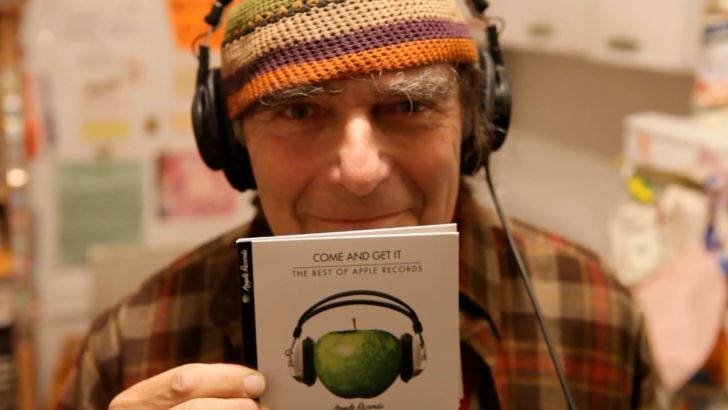


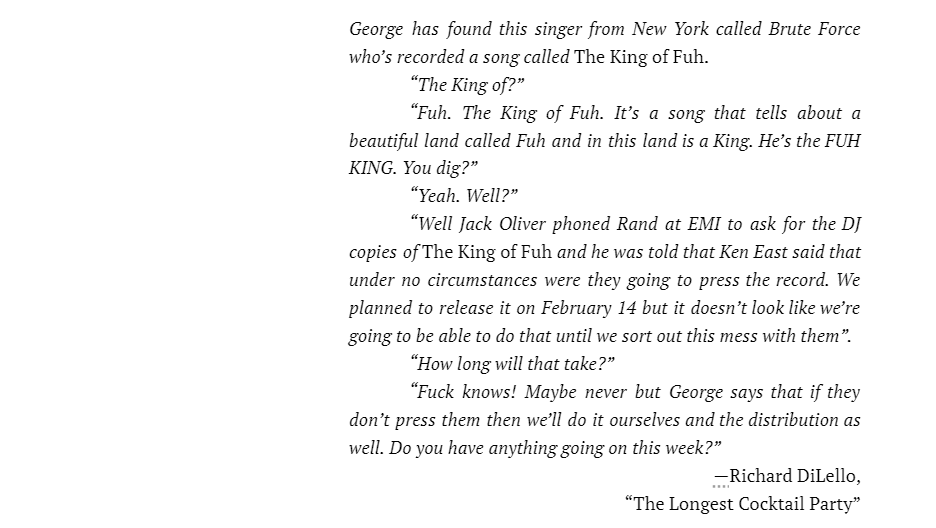
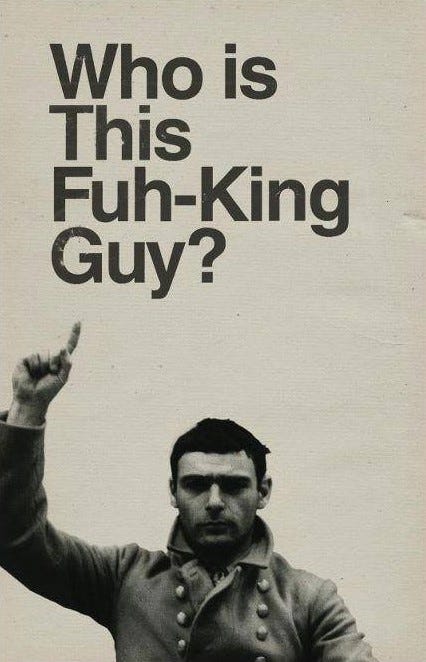
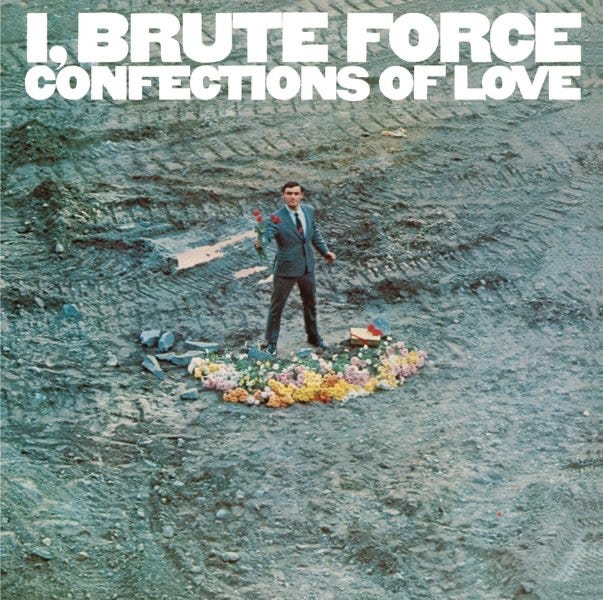



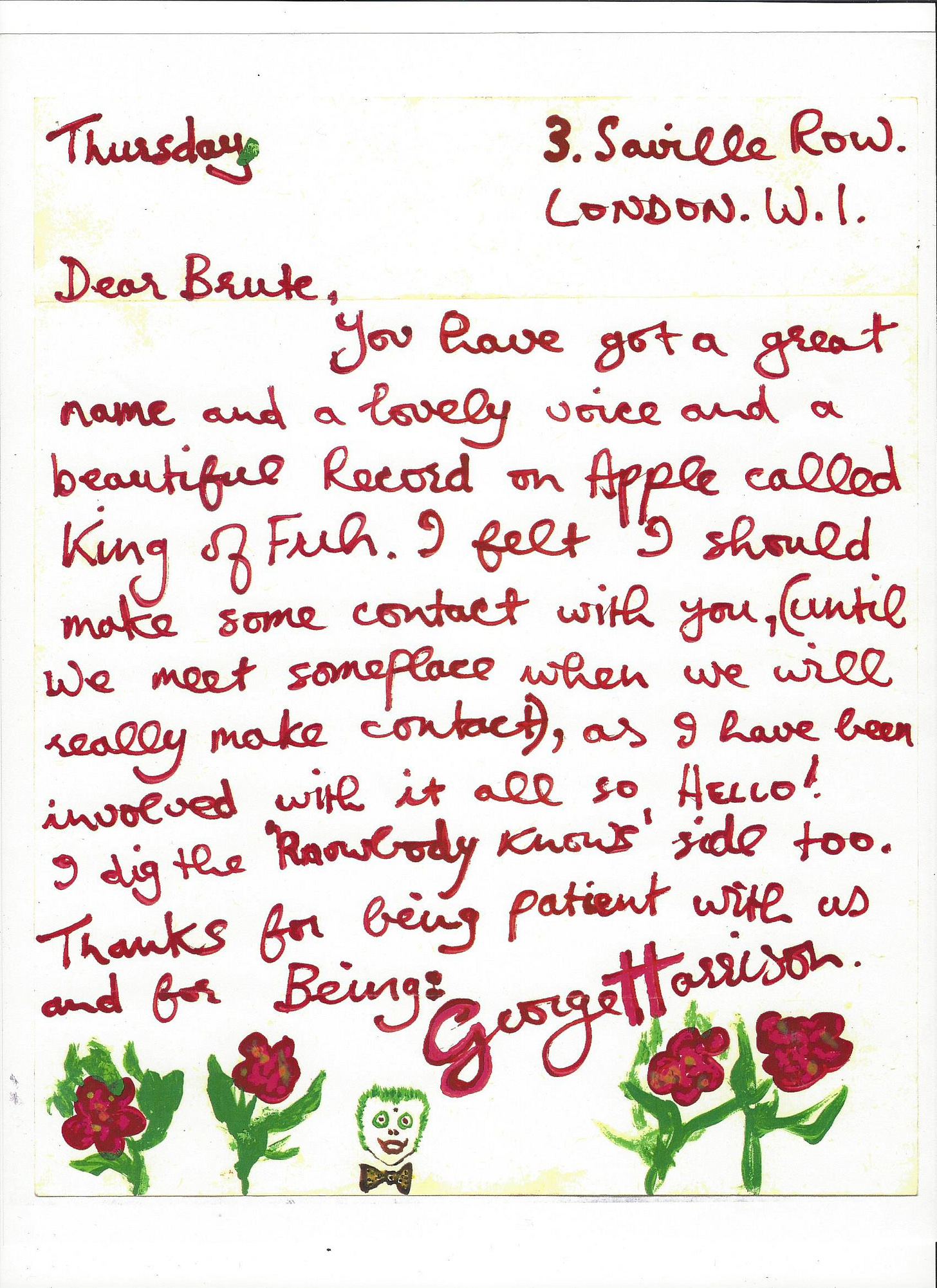
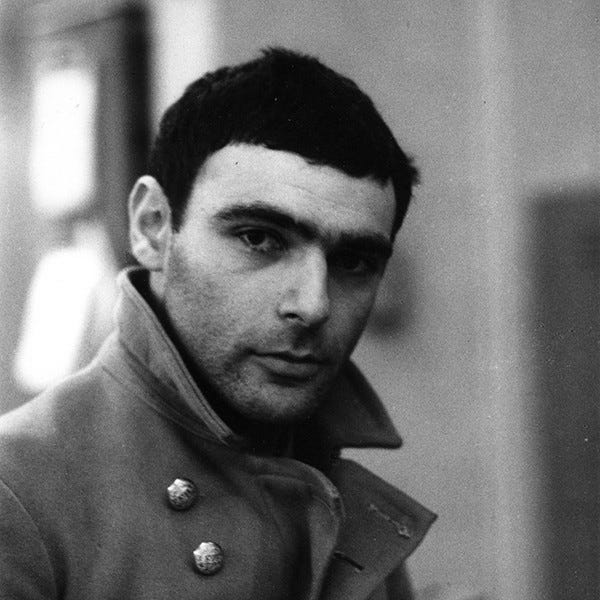
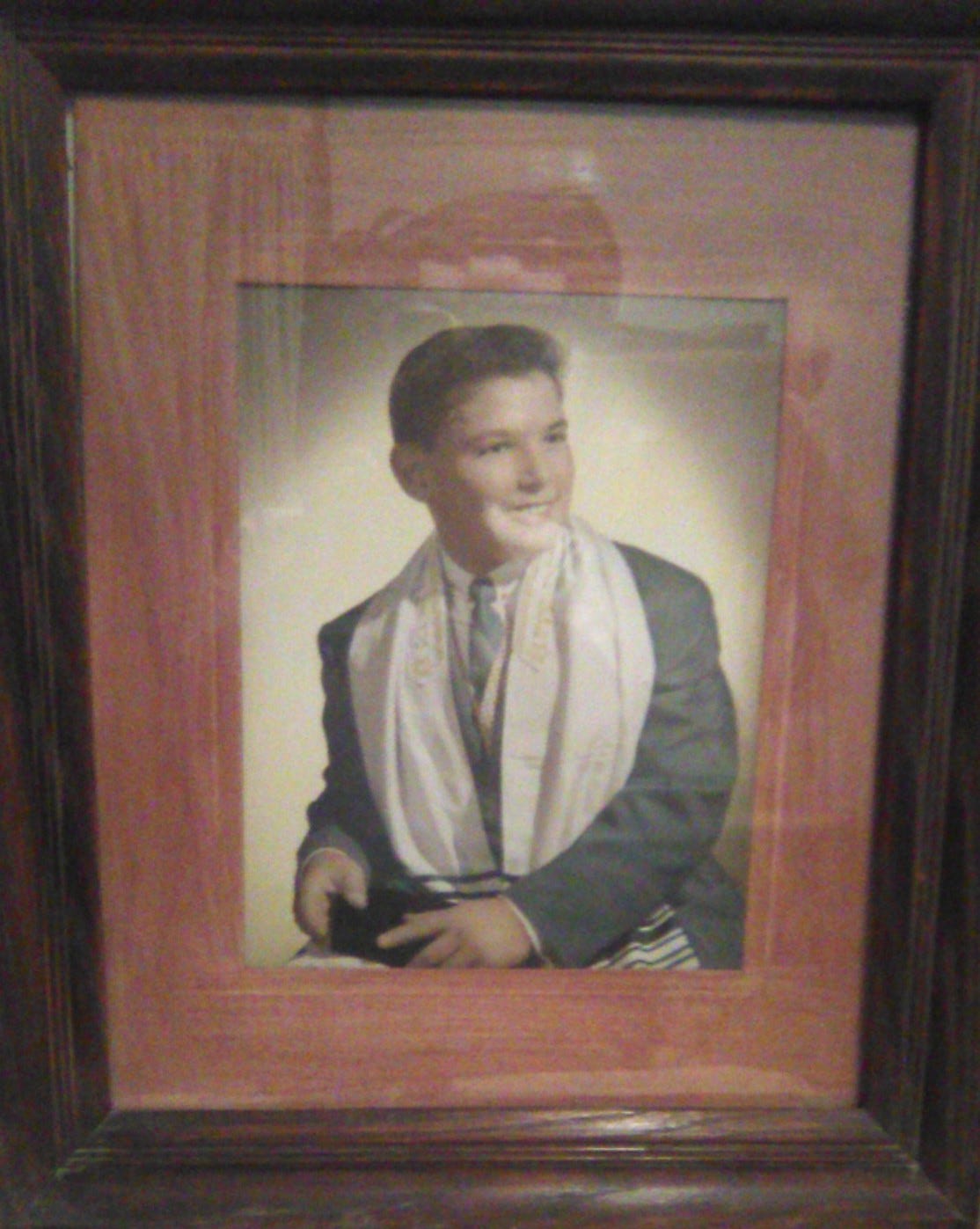

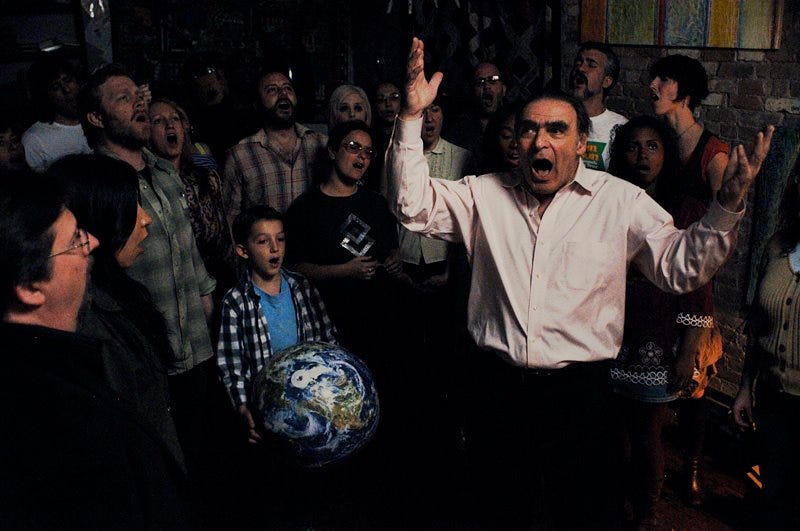
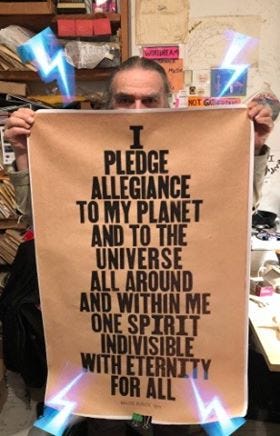
I Fuh King adore Brute Force !
All hail the King of Fuh!
All hail the Fuh King!
Herald trumpet fanfare 🎶🎺
Thank you for not censoring me! ;)